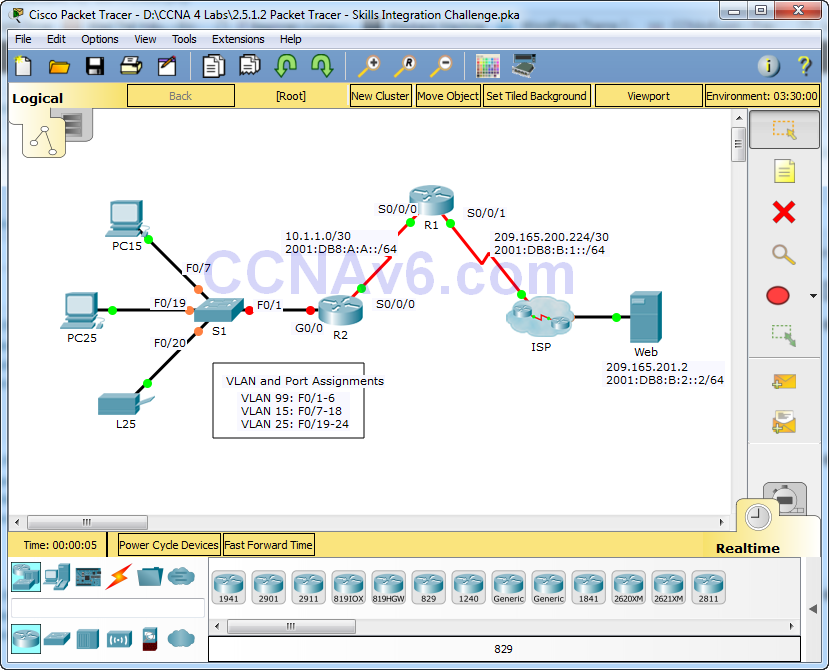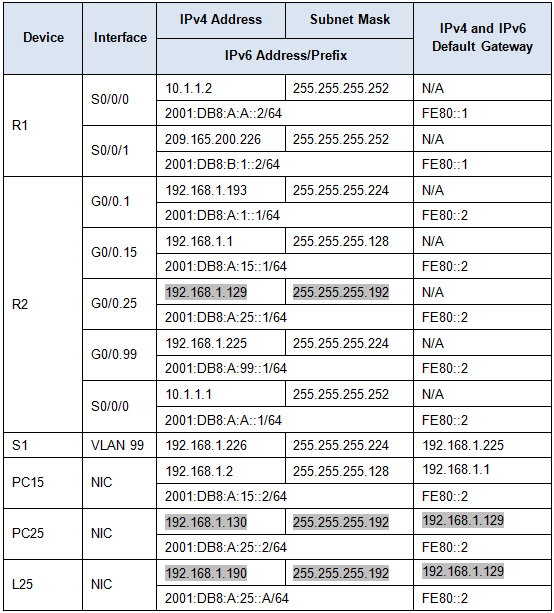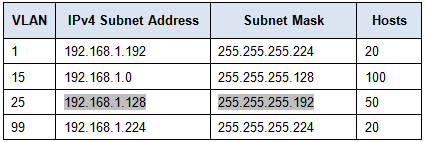Packet Tracer – Skills Integration Challenge (Instructor Version)
Instructor Note: Red font color or gray highlights indicate text that appears in the instructor copy only.
Topology

Addressing Table

Background
This activity allows you to practice a variety of skills including configuring VLANs, PPP with CHAP, static and default routing, using IPv4 and IPv6. Due to the sheer number of graded elements, you can click Check Results and Assessment Items to see if you correctly entered a graded command. Use the cisco and class passwords to access privileged EXEC modes of the CLI for routers and switches.
Requirements
Addressing
The addressing scheme uses the 192.168.1.0/24 address space. Additional address space is available between VLAN 15 and VLAN 1. VLAN 25 needs enough addresses for 50 hosts. Determine the subnet and complete the subnet table below.

Complete the Addressing Table by assigning the following addresses to VLAN 25:
R2 G0/0.25 – First IPv4 address
PC25 – 2nd IPv4 address
L25 – Last IPv4 address
Configure IPv4 addressing on the necessary end devices.
On R2, create and apply IPv4 and IPv6 addressing to the G0/0.25 subinterface.
VLANs
On S1, create VLAN 86 and name it BlackHole.
Configure S1 ports in static mode with the following requirements:
F0/1 is the native trunk for VLAN 99.
F0/7 – F0/18 as access ports in VLAN 15.
F0/19 – F0/24 as access ports in VLAN 25.
G0/1 – 2 and F0/2 – F0/6 are unused. They should be properly secured and assigned to the BlackHole VLAN.
On R2, configure inter-VLAN routing. VLAN 99 is the native VLAN.
PPP
Configure R1 and R2 to use PPP with CHAP for the shared link. The password for CHAP is cisco.
Routing
On R1, configure IPv4 and IPv6 default routes using the appropriate exit interface.
On R2, configure an IPv6 default route using the appropriate exit interface.
Configure IPv4 OSPF using the following requirements:
Use process ID 1.
Routers R1 and R2 are in area 0.
R1 uses router ID 1.1.1.1.
R2 uses router ID 2.2.2.2.
Advertise specific subnets.
On R1, propagate the IPv4 default route created.
Configure IPv6 OSPF using the following requirements:
Use process ID 1.
Routers R1 and R2 are in area 0.
Configure OSPF on appropriate interfaces on R1 and R2.
R1 uses router ID 1.1.1.1.
R2 uses router ID 2.2.2.2.
Connectivity
All devices should be able to ping the web server.
Scripts
Configure PC25 and L25 with IPv4 Addressing
Router R1
enable config t ipv6 unicast-routing username R2 password 0 cisco interface Serial0/0/0 encapsulation ppp ppp authentication chap ipv6 ospf 1 area 0 router ospf 1 network 10.1.1.0 0.0.0.3 area 0 default-information originate router-id 1.1.1.1 ipv6 router ospf 1 router-id 1.1.1.1 ip route 0.0.0.0 0.0.0.0 Serial0/0/1 ipv6 route ::/0 Serial0/0/1 end copy running-config startup-config
Router R2
enable config t ipv6 unicast-routing username R1 password 0 cisco int g0/0 no shut interface GigabitEthernet0/0.1 encapsulation dot1Q 1 ip add 192.168.1.193 255.255.255.224 ipv6 ospf 1 area 0 interface GigabitEthernet0/0.15 encapsulation dot1Q 15 ip add 192.168.1.1 255.255.255.128 ipv6 ospf 1 area 0 interface GigabitEthernet0/0.25 encapsulation dot1Q 25 ip address 192.168.1.129 255.255.255.192 ipv6 address FE80::2 link-local ipv6 address 2001:DB8:A:25::1/64 ipv6 ospf 1 area 0 interface GigabitEthernet0/0.99 encapsulation dot1Q 99 native ip add 192.168.1.225 255.255.255.224 ipv6 ospf 1 area 0 interface Serial0/0/0 encapsulation ppp ppp authentication chap ipv6 ospf 1 area 0 router ospf 1 router-id 2.2.2.2 network 192.168.1.0 0.0.0.127 area 0 network 192.168.1.128 0.0.0.63 area 0 network 192.168.1.192 0.0.0.31 area 0 network 192.168.1.224 0.0.0.31 area 0 network 10.1.1.0 0.0.0.3 area 0 ipv6 router ospf 1 router-id 2.2.2.2 ipv6 route ::/0 Serial0/0/0 end copy running-config startup-config
Switch S1
en conf t vlan 86 name BlackHole exit interface FastEthernet0/1 switchport trunk native vlan 99 switchport mode trunk interface range Gig0/1 - 2 , FastEthernet0/2 - 6 switchport access vlan 86 switchport mode access shutdown interface range FastEthernet0/7 - 18 switchport access vlan 15 switchport mode access interface range FastEthernet0/19 - 24 switchport access vlan 25 switchport mode access end copy running-config startup-config

is there a part 2?
Really good practice LAB. Nice work!!